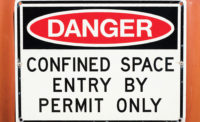Willie shot back, “I’m not goin’ all the way down and I gotta get this job done and you know it — you gave it to me, Joe!â€
Joe shook his head in disbelief but kept his composure. Maybe I did rush him a bit, he thought.
“I gave it to you because I trusted you’d do it the right way, Willie! That pit requires a permit and all that goes with it! You know the rules — it has limited ways to get in and out; you’re able to do your work in it, but it’s not at all designed for your regular kinds of work. It’s just like the silos, vessels, and dikes we work in. Besides, we just went over this in our training a couple of months ago — you sat right next to me. Come on over here Willie, let’s talk.â€
Willie drug his feet and slowly walked over to Joe a bit sheepishly, but knew he needed a talkin’ to.
“See this artwork Willie. I’m taking it up to graphics — it’s going to be part of the new flyer and poster for our confined space work. Look at these stats. Right here in our state of Virginia, confined space deaths make up over five percent of all fatalities. Almost 50 people died last year! Do you want to be one of those numbers, Willie?â€
Willie quietly responded, “Nope.â€
Joe continued talking to Willie to get his thoughts across.
“There’s even more — look at this. Most of the confined space accidents and fatalities happen in manufacturing, construction, and service industries. That means we’re included. And most accidents involve issues with the atmosphere or with fires and explosions. Does this hit home for you?â€
“I hear you, Joe — but come on, it ain’t gonna happen to me.â€
“Well it can and will happen to you — and your age group is the group most often involved in confined space accidents — you’re in your late thirties, right?â€
Joe was heating up but knew this was an important moment — most people only “get caught†when it’s too late. Often people don’t have the opportunity to “get caught†and then be coached and reprimanded so they’re able to reorder their ways — making them safe ways. Joe thought this was an especially opportune time to be spent with Willie. He was a good worker and most always did his best to do what he felt was necessary to get the job done — a good company man, so to speak. Joe wasted no time to pull a confined space permit from his back pocket.
“Willie, you’ve got to test for results — make sure it’s safe — you know we use a lot of inerts like argon around here.â€
Willie nodded in agreement — he knew that was a point that couldn’t be argued.
“Somebody’s got to sign and verify entry — related to what’s going on in the pit — atmospheric conditions are super important. List the purpose of your entry and the hazards — you know what they are, Willie. You have to control other hazards with lockouts and tags — this kinda stuff also needs a permit most of the time. Like the hot work you sometimes do. And you know we almost always have to ventilate the spaces around here and we have the best equipment that money can buy. You know how to use all the PPE including the lanyard, harness, and safety hoist for the silo work. We have new emergency numbers, too — you know that right, Willie?â€
Willie said, “I know we have some new emergency services around here.â€
Joe continued with the help of the permit.
“Communication with your guys outside the pit or silo has to be continuous — you’ve got to maintain that communication — we like your voice, Willie. There are only a few people like you around here. You’ve been trained for the permit confined entry work, you know the hazards, and you’re a great worker. There are no better trained workers around here than you and the attendants on these kinds of jobs.â€
“I was trained as an attendant first,†said Willie.
“I know what’s important — never leave the site until relieved. Know the hazards, procedures for rescue, and signs of concern with the potential victim — physical kinds of symptoms. Order evacuation and get outside help if there are any concerns with the work that could threaten my co-workers. And I know that untrained people can’t enter or interfere with the space. Do you wanna hear more, Joe?â€
“No, I think you have it Willie,†said Joe with just a slight smile.
“Willie, I do think you could use some brushing up on the test equipment we have. I don’t think you’ve been using it as much lately and a lot of it’s new. We haven’t had much confined space work this year.â€
“I agree,†Willie said with validation.
“Willie, people look up to you and follow your lead — are you committed to doing the confined work like we talked about it?â€
“You’re right, Joe — but sometimes I feel rushed and know that our supervisors want to get the work done — and fast!â€
Joe interrupted, “I know it sometimes may feel like you’re being rushed but everyone here wants you to go home to be with your beautiful family — the wife and kids. If it feels like we’re rushing you just say so — push back on us.â€
“I don’t want to get fired,†Willie shot back.
“No it’s not going to be like that, Willie.â€
Joe finally closed. “Here’s a copy of OSHA’s reg — 1910.146 — you’ve seen it. Read it over and come see me tomorrow about the test equipment. Are you with me on this, Willie?â€
“I’m with you all the way,†said Willie with a smile.
